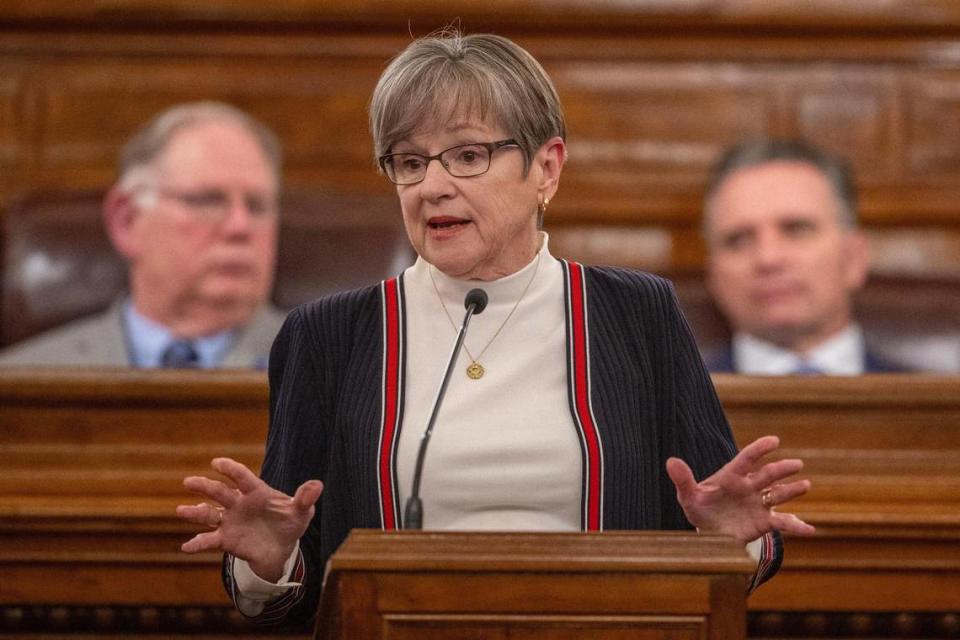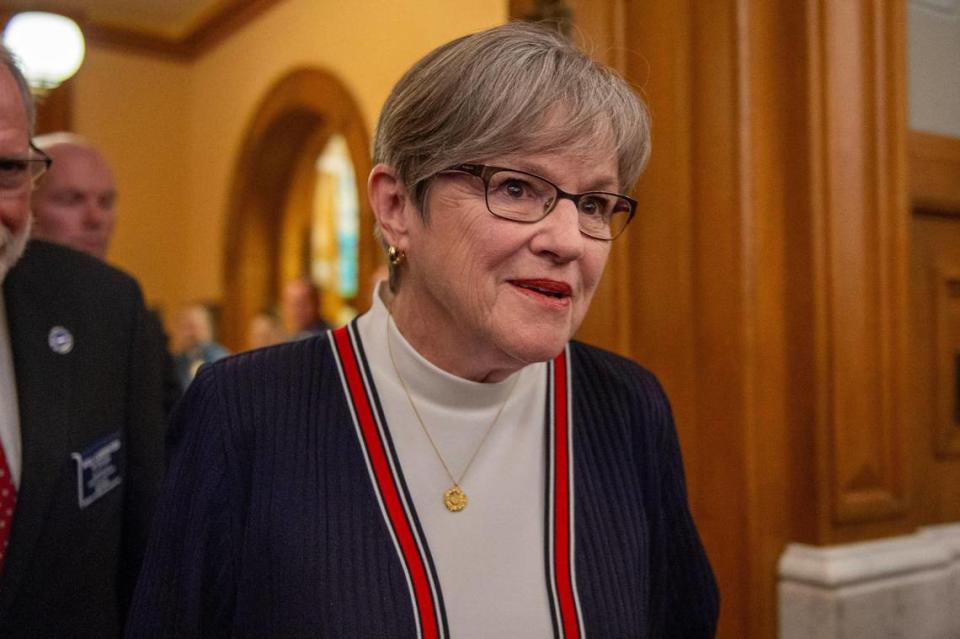Kansas Republicans have moved away from the flat tax. Will Gov. Kelly come on board?
- Oops!Something went wrong.Please try again later.
After a Kansas House Committee unanimously approved GOP leadership’s latest tax plan Thursday, an aide to Democratic Gov. Laura Kelly walked up behind Republican Rep. Adam Smith, the committee chairman, and patted him on the back.
The vote represented a new stage of tax debates in the Kansas Legislature as Republicans in the House walked away from the flat income tax they had so desperately wanted and instead threw their support behind a dual rate plan.
Last month Republicans failed to override Kelly’s veto of their latest flat tax plan and the governor had pledged to reject any other flat tax that landed on her desk.
Republicans pivoted to the dual rate in an effort to gain a veto-proof majority, or gain the support of Kelly and her democratic allies in the Legislature. But with two weeks left in Topeka before a lengthy break, it’s unclear whether Republicans have moved enough to earn that support or if lawmakers will once again return home without any tax cuts.
“It’s progress. It gives us something to talk about,” Kelly said last week when asked about the new plan. “I can’t tell you that the actual bill is acceptable but I do see it as an opportunity to engage in conversation with the Legislature to come up with something that works for all of us.”
Kelly and Republicans have said lawmakers must pass some form of tax cuts this year.
Kelly has threatened to call Republicans back to Topeka for a special session if it doesn’t happen. During committee discussion Wednesday, Rep. Nick Hoheisel, a Wichita Republican, said Kelly should be recalled and every single lawmaker should be voted out of office if tax relief isn’t delivered.
“It would be an abomination,” he said.
‘Not my preference’
The latest tax package would exempt all income under $7,000 from income tax, set a 5.2% tax for income under $30,000 and a 5.65% tax for income above $30,000.
It also phases out all income tax on Social Security over four years and reduces state property taxes. It eliminates a state fund that hasn’t been funded for years meant to help local governments reduce property taxes and reinstates a long unfunded fund meant to help local governments repair roads.
Speaking to reporters Kelly said she didn’t love the plan, and would rather stick with the existing three structure system.
“It’s not my preference, I’m very comfortable with the three tiers we have now,” she said.
And Senate Minority Leader Dinah Sykes, a Lenexa Democrat, quickly rejected the plan as a non-starter.
Sykes had introduced an amendment on the House floor that would lower the existing income tax rates while keeping three rates. The amendment failed.
“Reducing those rates I felt like that was a concession that I was willing to take and it was a concession that I was willing to go to the governor and ask for a signature on,” she said.
The bill passed out of the House committee Thursday is likely far from the final product. The bill could run on the House floor any day and face amendments. If it passes, it will then go to the Senate where lawmakers are likely to change it again.
Those changes could be instrumental in making or breaking the support from Democrats.
Rep. Tom Sawyer, the top Democrat on the House Taxation Committee, said he believed Kelly would need to see a quicker elimination of the social security tax and the accelerated elimination of the food sales tax. Both elements were in a proposal Kelly released at the beginning of the year.
“The elements that are in this bill are all good, other than getting rid of the LAVTRF,” Sawyer said, referring to the Local Ad Valorem Tax Reduction Fund. “It’s just a matter of getting a couple other pieces in there.”
Do Republicans need Kelly?
Of course, Kansas lawmakers could still pass the plan without Kelly or Democrats if they’re able to gain a veto-proof majority in both chambers.
That will first require getting the Kansas Senate, which passed a new version of the flat tax earlier this year with a veto-proof majority, on board. Senate President Ty Masterson, an Andover Republican, said last week he would still like to see the flat tax move forward, but he acknowledged it may not be possible.
“We’ll find some other solution that works,” he said.
The dual rate appears to have earned the support of some Republicans who voted against the flat tax earlier this year.
Rep. Mark Schrieber, an Emporia Republican who voted against the plan, said last week the new version seemed more palatable.
Rep. Mike Dodson, a Manhattan Republican who switched his yes vote to a no vote to sustain Kelly’s veto, agreed.
“It does most of the things I was looking for which is a slight reduction in the amount of tax that we’re going to cut and we’re going to be easing into the flat tax,” he said.
In the Senate, Kelly recruited three Republican senators to support her plan at the beginning of session – making it difficult for Republicans to find a veto-proof majority.
One of those senators, Sen. Rob Olson of Olathe, said he still sees a dual rate as the wrong approach that benefits the wealthy over the average Kansan.
Sen. John Doll, a Garden City Republican who joined Kelly but voted to pass the most recent flat tax plan called the dual rate proposal a massive proposal. But Doll said he would need to see changes to the social security tax and other items to feel comfortable voting for it.
But does he think a deal will come together in time?
“If I was a betting man, which I’m not, I think they’re still too far away from what the governor’s plan was,” he said.


